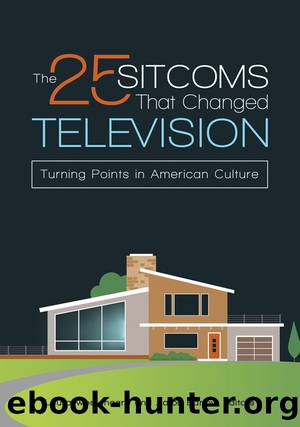The 25 Sitcoms that Changed Television by Aaron Barlow

Author:Aaron Barlow
Language: eng
Format: epub
ISBN: 9781440838873
Publisher: ABC-CLIO
THEYâRE JUST NOT BLACK ENOUGH
Although The Cosby Show has been praised for its gender politics, it has also persistently been critiqued for its representation of race. The show has been labeled by some as not being âblack enoughâ because it lacks overt conversation concerning race and poverty and focuses on a middle-class family. Cosbyâs position has been that it isnât his duty âto make all the black social statements,â and his show takes a classy approach to dealing with race by illustrating âlife in the positive sense.â24 Criticism of The Cosby Show engages long-standing debates concerning respectability politics, the idea that the way African Americans dress or carry themselves will affect their ability to eradicate discrimination. It has long been thought that positive images of black Americans in the media will significantly contribute to changing other Americansâ perceptions of the group. Cosby adheres to this viewpoint, and favorable assessments of The Cosby Show credit it with convincing Americans âto view blacks as human beings.â25
Nevertheless, the argument could be made that when Cosby took on the task of single-handedly eradicating decades of negative images of African Americans he also became solely responsible for that image. As a result, Cosby had a duty to consider criticisms levied at his show. His choice to ignore such criticism resulted in some considering him arrogant.26 Still, Cosby has a point that it is not his sole responsibility to make social statements for all African Americans. A show about one family canât comprehensively represent an entire group. In addition, it is also important to note that Cosby did demonstrate a commitment to addressing social issues affecting African Americans through A Different World.27 The sitcomâs college campus setting allowed the show to provide characters of various economic backgrounds and values and to develop storylines on topics such as apartheid in South Africa, because activism and controversial discourse is an expected part of the college experience. The Cosby Show canât represent all facets of African American life, but its success made it possible for more programs with African American characters to appear on television. Shows that succeeded it such as Roc provided more diverse representations, including ones marked by class (the title character of Roc was a sanitation worker).
Another critique of The Cosby Show is that it isnât realistic or âblack enoughâ because it represents the experiences of a middle-class African American family. Research conducted on television audiences have consistently cited that respondents holding negative views of The Cosby Show deem it unrealistic. Leslie Innis and Joe R. Feaginâs interviews with 100 middle-class black viewers reported that some respondents questioned why the Huxtables never faced serious tragedy and thought it was unrealistic for one family to contain both a lawyer and a doctor.28 These are valid critiques, but it is also likely that African American viewers place a higher burden on The Cosby Show to provide realistic images of African Americans than they would place on other shows because of the historical legacy of black images on television. Furthermore, scholars such as Patricia D.
Download
This site does not store any files on its server. We only index and link to content provided by other sites. Please contact the content providers to delete copyright contents if any and email us, we'll remove relevant links or contents immediately.
The Vikings: Conquering England, France, and Ireland by Wernick Robert(80511)
Ali Pasha, Lion of Ioannina by Eugenia Russell & Eugenia Russell(40228)
The Conquerors (The Winning of America Series Book 3) by Eckert Allan W(37378)
The Vikings: Discoverers of a New World by Wernick Robert(36964)
Cecilia; Or, Memoirs of an Heiress — Volume 1 by Fanny Burney(32533)
Cecilia; Or, Memoirs of an Heiress — Volume 2 by Fanny Burney(31931)
Cecilia; Or, Memoirs of an Heiress — Volume 3 by Fanny Burney(31923)
Empire of the Sikhs by Patwant Singh(23065)
The Secret History by Donna Tartt(19012)
Hans Sturm: A Soldier's Odyssey on the Eastern Front by Gordon Williamson(18561)
Cat's cradle by Kurt Vonnegut(15316)
Pimp by Iceberg Slim(14473)
Sapiens: A Brief History of Humankind by Yuval Noah Harari(14355)
Talking to Strangers by Malcolm Gladwell(13338)
Norse Mythology by Gaiman Neil(13327)
Leonardo da Vinci by Walter Isaacson(13302)
4 3 2 1: A Novel by Paul Auster(12360)
Underground: A Human History of the Worlds Beneath Our Feet by Will Hunt(12080)
The Radium Girls by Kate Moore(12009)
